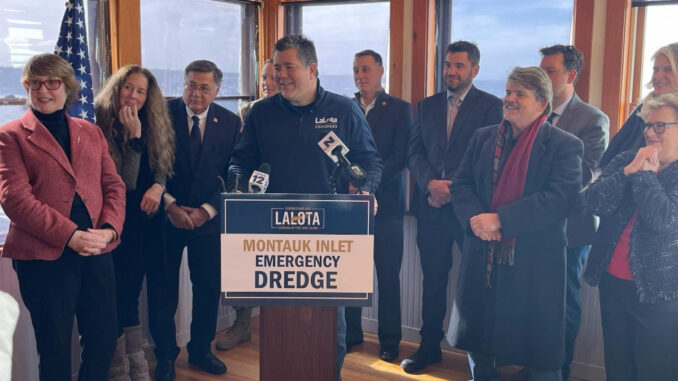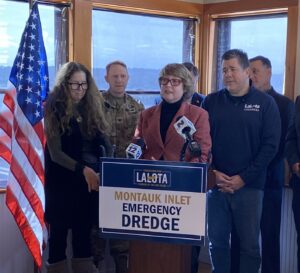
By Hank Russell
Representative Nick LaLota (R-Rocky Point) brought together a coalition of federal, state, and local officials, local stakeholders, and the United States Army Corps of Engineers (USACE) in Montauk on February 18 to provide an update on the emergency dredge of Lake Montauk Inlet, a critical waterway for Long Island’s commercial fishing industry, and the regional economy.
The press conference highlighted the urgency of the dredge, which is essential to ensuring the continued safety and accessibility of the inlet. LaLota’s coordinated leadership in securing federal action has been instrumental in advancing the initiative, which was critical for both protecting local maritime and restaurant industries, and safeguarding Long Island’s waterways.
“This is what good government looks like. We are here today because of a united effort from all levels of government to respond swiftly to a critical need in our community. I am especially grateful to the U.S. Army Corps of Engineers for their swift response to our request for immediate action, as they are the ones doing the heavy lifting here, quite literally. The emergency dredge of Lake Montauk Inlet is not just about accessible waterways, it’s about maritime safety preserving our commercial fishing industry and local economy,” said LaLota.
East Hampton Town Supervisor Kathee Burke-Gonzalez echoed LaLota’s sentiments. “This is what government should be: responsive, collaborative, and focused on making life better for the people we serve,” she said. “And today, we are proving

that when we work together—town, county, state, and federal—we can accomplish great things.”
Bonnie Brady, executive director of the Long Island Commercial Fishing Association, underscored the importance of this dredging project for the commercial fishing industry, which relies on the inlet to access the waters of the Atlantic:
“The Montauk commercial fishing fleet is grateful for the gargantuan effort of Congressman LaLota and his team to bring the Army Corps of Engineers’ Dredge Murden to Montauk in record time. When a boat runs aground, it can be life-threatening and in some cases you only have seconds to react. Congressman LaLota’s efforts have taken that concern off the table for New York State’s largest commercial fishing port.”
The emergency dredge is a key step in preserving Lake Montauk Inlet to ensure it remains navigable for both recreational and commercial vessels. LaLota’s work continues to showcase his dedication to addressing the urgent needs of his district and bringing together stakeholders from all levels of government to find practical solutions.
“Montauk Inlet is more than just a waterway,” said Burke-Gonzalez. “It is the beating heart of our local fishing industry, a vital link to our maritime economy, and a gateway for both commercial and recreational boaters. For generations, our fishing fleet has been at the heart of our community, and we have fought hard to ensure they have the safe access they deserve. The start of dredging is a significant step toward protecting this critical industry and the families who depend on it.”
The U.S. Army Corps of Engineers (USACE) was scheduled to dredge and deepen Montauk Inlet to 17 feet in 2024, allowing for safer navigation into Lake Montauk. A delay in the project timeline resulted in dangerous shoaling that left large commercial vessels at risk of running aground.
After working with USACE and local authorities, a solution was reached to address the emergency situation: the Dredge MURDEN, which came from Cape May, New Jersey, is now in the process of removing the shoals to open the inlet to 12 feet. The operation began on February 15, 2025 and is expected to take approximately four days. This work will restore regular navigability until the planned 17-foot dredge later this year.

